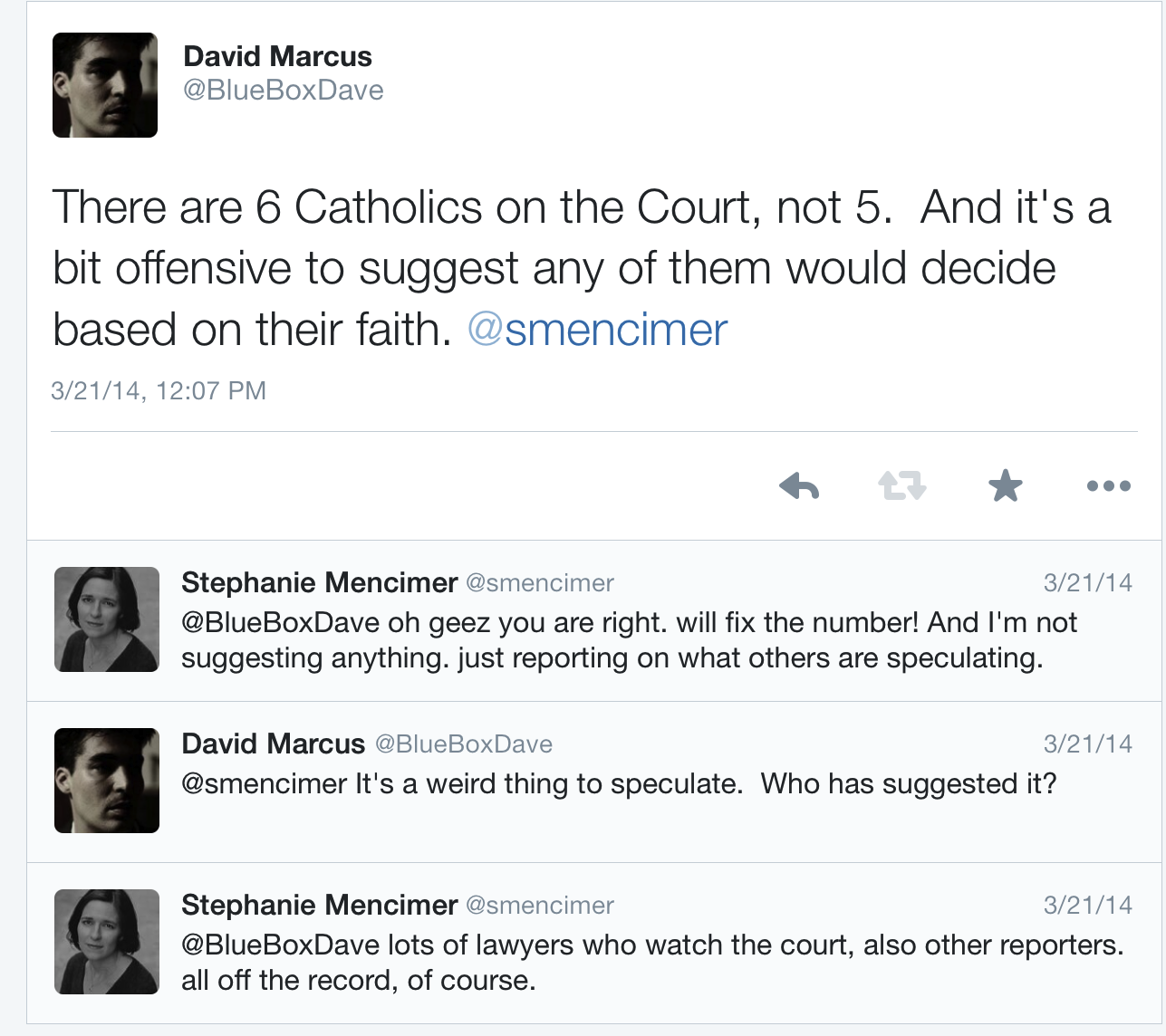
When my phone flickered with the news that the Supreme Court had found in favor of Hobby Lobby on Monday, I knew exactly what the result would be. It was perfectly clear that the religion of the five Justices who found in favor of Hobby Lobby would be brought into question. It has happened before, both in the distant and recent past. In March, as the Supreme Court heard arguments on the case, Mother Jones had this to say:
No one seems to really have a sense of how the court might rule. On one side, court watchers have speculated that with five six Catholics on the bench, Hobby Lobby has a decent shot of prevailing.
I was troubled by this idea that Catholics might be unable to perform public duties fairly, that being Catholic would negatively influence a justice’s interoperation of the Constitution. Not to mention that the author thought there were only five Catholic Justices. So I tweeted at her. This was the exchange:
Of course. Nobody would actually say that Catholic justices are using the court to promote the Vatican’s agenda in America. That would be absurd, right? That was all settled by JFK in 1960. Well, apparently not. Mother Jones, which regularly decries the influence of anonymous political speech, relied on hidden sources for these “concerns” about Catholic judges. After Monday’s decision, the fear of Catholic influence on the court found the light of day.
The tolerant Huffington Post, in their article,“The Uncomfortable Question: Should we have Six Catholic Justices on the Supreme Court?” led the way. The article is careful to be clear that “even by raising the question one exposes oneself to a charge of bigotry.” So I would like to make it very clear. If you think Catholics are less likely to serve the public interest than any other group of people, you are an intolerant bigot. You aren’t just asking the question, you are giving credence to an anti-Catholic bias as old as any in this country. And you should stop it.
Daily Kos was less coy. In their article, “Catholic Appointees Betray their Oath,” an author named MugWumpBlues launched into a vitriolic anti-Catholic diatribe that is as disgusting as it is un-factual and incoherent. The article begins: “They called themselves Puritans because they wanted to purify the Christian Church from the anathema of the Catholics. The bright robes, the high ceilings, all swindler’s tricks to mulct the masses.” Setting aside the fact that the Puritans were escaping the Anglican, not the Catholic, church, and the malicious assertion that Catholicism is a “swindler’s trick,” the Daily Kos may be credited with the finally asserting the true Progressive position.
Let’s Substitute Your Religion With Ours
The anonymous author goes on to say, “Rational people have long understood that the superstitious—call it religion if you want to be polite but superstitious they are—are selfish, gullible and easily manipulated.” Mother Jones, Huffington Post, and Daily Kos are all pointing in one direction. It is important to understand what they are directing us towards. Reason, the rational, data, and facts and figures and graphs and info-graphics and “10 reasons you are better than everyone else.” These are the true ways to know right from wrong. And if you disagree, if you believe silly superstitions such as centuries-old religious beliefs, you are unfit to serve the people.
The Progressive message is clear. Only atheists should govern. Only those who are free from superstitions about right and wrong are fit to lead. A moral grounding in the Muslim, Jewish, Hindu, or Catholic faith serves as an intellectual blinder, a disability in administering justice. But what justice or morality do the Progressives base their judgments on? Upon what purely physicalist fulcrum of moral judgment does their certainty rest? In fact, there is none. And this is an essential feature of Progressivism that all Americans need to understand.
The closest thing to a well thought out moral philosophy that Progressives can claim is Utilitarianism, Jeremy Bentham’s old saw mill that equates the moral choice with the choice that makes the most people happy. The Progressives say we should not concern ourselves with what the Constitution says, but rather with what would make the most people happy, with what most Americans want. In the late 19th century, this theory was quite in vogue with the elites and the creative class, as it is now. But at the dawn of 20th century, British philosopher G.E. Moore found a fatal flaw in this theory. He sensed a syllogistic fallacy in the premise. He wrote:
Premise 1: If X is (analytically equivalent to) good, then the question ‘Is it true that X is good?’ is meaningless.
Premise 2: The question ‘Is it true that X is good?’ is not meaningless (i.e. it is an open question).
Conclusion: X is not (analytically equivalent to) good.
X in this case can refer directly to any progressive notion of morality. For example, if allowing abortion is analytically equivalent to good, then the question, “Is it true that allowing abortion is good?” is meaningless. But whether allowing abortion is good is an open question. Therefore allowing abortion is not analytically equivalent to good. This is where Catholics and other religious people accept our own inability to parse out good and evil individually and look to a higher purpose or being. It may be superstitious, but it is no less rational than any secular concept of morality.
Take the Plank Out of Your Own Eye
The Progressives who criticize the Catholics on the bench for imposing Papish doctrine on our nation ought to look to the plank in their own planks. How constantly are we urged by the Left to understand that the vast majority of Muslims are peaceful? That reading too much into the Koran’s references to violence or women’s rights is the bigoted act of a dominant culturism? But somehow the fact that a Supreme Court justice believes in one holy, Catholic, and apostolic church is a threat to republic.
Here is what Justice Alito actually wrote in his opinion, presumably between saying the Angelus and rooting for Notre Dame: “We Hold that the regulations that impose this obligation violate the RFRA, [Religious Freedom Restoration Act of 1993, signed by a non-Catholic named Clinton] which prohibits the Federal Government from taking any action that substantially burdens the exercise of religion unless that action constitutes the least restrictive means of serving a compelling government interest” The obvious point is that government is free to provide contraceptives.
The attack on Catholicism from the Left on this story is a cheap and easy shot. It’s a placeholder for actual discussion. We all know that none of these outlets would talk about Judaism or Islam in similar terms. I am a Catholic, I go to church, I was married in the church, I raise my son in the church. I believe its teachings are exclusively true, just as Jews and Muslims and Baptists do. I don’t demand that anyone agree with me. Well maybe my son, for now. But the idea that being Catholic should bar anyone from public service, or call into question their ethics on that basis alone, is something I never thought I would see in this country.
In 1960, a Catholic ran for the White House. When confronted with the possibility that his devotion to his religion might make him unfit for office he said: “Are we going to admit to the world that a Jew can be elected mayor of Dublin, a Protestant can be elected Foreign Minister of France, a Moslem can be elected to the Israeli parliament—but a Catholic cannot be President of the United States? Worse still, are we going to admit to ourselves that one third of the American people is forever barred from the White House?”
As a Catholic American, I thought that question was long since answered. Apparently, I was wrong.










